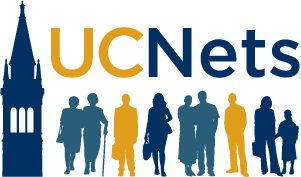Participant FAQ
ABOUT MY PARTICIPATION
- I got an invitation to participate while I was making a phone call, and it referred me to this website. What’s this study about and how do I participate
- What are the benefits for participating in UCNets?
- When are the results going to be available?
- How are you going to use the results of this study?
- Will my responses be confidential?
- Can I change my mind about participation later?
- How do I update my contact information?
- I wasn’t contacted by mail but I’d like to participate anyhow.
- Who can I contact for more information on UCNets?
- You mentioned that if we are emotionally affected by the survey we can talk to someone. What is the resource for counseling?
I got an invitation to participate in the mail. How do I participate?
It’s the same study as the parent study described throughout this website in terms of content and length, but there is only this one wave planned, not three. You will take it as a web survey using your laptop or desktop computer (a smartphone or tablet is not efficient). You can reach out to us at ucnets@berkeley.edu). The rest of the information below applies to your study. Thank you for your participation!
What are the benefits for participating in UCNets?
The UC NETS study seeks to understand how our personal relationships (with family, friends, neighbors, community members, etc.) may affect our overall health and well-being. However, we cannot do this without the participation of members of the community like yourself. We will always provide an ‘incentive,’ that is, a modest monetary compensation; the amount depends on the length of the survey. Our newsletters (posted here, and also mailed to you) will update you on the project and its findings, which will help shape future policies and programs that would benefit you and your loved ones.
When are the results going to be available?
We already have some results available, some published papers and other conference presentations. You can visit the Publications page to see what’s been done thus far.
How are you going to use the results of this study?
The study will be used to inform scholarly research, policy makers, and any other interested persons.
Will my responses be confidential?
Yes! All responses will be kept confidential. While we will keep a record of responses, all identifiable information (e.g. name, place of residence, etc.) will be removed. When the results of the study are presented or published, no real names will be used.
Can I change my mind about my participation later?
Definitely. Registration is not binding and you can choose not to continue at any point through the process.
How do I update my contact information?
Please email us at ucnets@berkeley.edu or call us at 510-643-1270 to update your contact information.
Who can I contact for more information on UCNets?
If you have any questions, please contact us at ucnets@berkeley.edu or 510-643-1270.
You mentioned that if we are emotionally affected by the survey we can talk to someone. What is the resource for counseling?
This does happen to a few people, which is why we have the information.
Alameda County: Crisis hotline is 1-800-309-2131, or visit their website for phone numbers and walk-in clinics: http://www.mhaac.org/need-help-now.html.
Contra Costa County: For psychiatric emergencies or referral information, call 1-888-678-7277 any time day or night. The call is free. The Crisis Hotline is 800-833-2900. Or visit their web page, http://cchealth.org/mentalhealth/
Marin County: or visit https://www.marinhhs.org/mental-health-substance-use-services
San Francisco Residents: Call: 415-255-3737, or 888-246-3333 any time of the day or night.
San Mateo County: 24-Hour Crisis Hotline: (650) 579-0350, or visit http://smchealth.org/mentalhealth.
Santa Clara: 1(800) 704-0900 or (408) 885-5673, or visit http://www.sccgov.org/sites/mhd/Pages/default.aspx
Nationwide Hotline: 1-800-SUICIDE; 1-800-273-TALK (8255)
Si usted o alguien que usted conoce esta en una crisis por favor llame a la Red para la Prevención del Suicidio al 1-888-628-9454.
